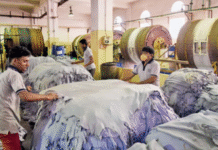Walton to manufacture the critical respiratory machines

The Military Institute of Science and Technology (MIST), an engineering university run by the Bangladesh Armed Forces, has designed a ventilator, in the most positive development for the nation panicking from the coronavirus pandemic.
Ventilators blow oxygen into the lungs of patients suffering from severe pulmonary stress and are essential for saving the lives of the sickest COVID-19 patients. And Bangladesh, a nation of more than 16 crore, has only 1,250 ventilators.
MIST has received the certification of the design of the ventilator from a body of the World Health Organisation and is scheduled to go for a clinical testing from April 4 at the Combined Military Hospital in Dhaka.
Syed Mahfuzur Rahman, head of biomedical engineering department of MIST, shared the development during a virtual press conference organised by Zunaid Ahmed Palak, state minister for the ICT division.
In another development, Bangladesh yesterday received the patent, design and source code of the PB 560 model ventilator of Medtronic, a global medical device manufacturer, Palak said.
The government plans to go for local manufacturing of the highly technical medical equipment that are desperately in short supply worldwide.
MIST will go for stimulation from today, Rahman told The Daily Star after the media briefing.
“We are maintaining very close contact with the ICU department of the CMH and after completion of the simulation we will go for clinical testing.”
And if any suggestion comes from the ICU team, those will be accommodated before applying to the Directorate General of Health Services (DGHS).
MIST informed the DGHS about the development. The state agency has assured the university of all kinds of support to expedite approval from local and international bodies, he added.
Local technology company Walton is also maintaining contact with MIST. If the ventilator design gets approval, Walton will start manufacturing it.
“We have already suggested Walton to started to work on hardware assembling and it is doing its part,” Rahman added.
Meanwhile, ICT Division will sit today with the research and development team of Medtronic’s Hyderabad office. Interested local technology companies will also attend the meeting, Palak said.
“We are not sure how long it will take to develop ventilators in the country, but once the first device is manufactured, the process will be easier and bulk manufacturing will begin.”
It might take a few weeks to complete the whole process and the price will be much lower than the imported ones, he said.
In order to manufacture, Medtronic’s technological support will be required at least for the first batch of products as it will not be easy for the local talent to produce them by only just following the source code and design.
Walton has showed interest in manufacturing the Medtronic ventilators, too. Some other local technology companies are also keen to join in the effort, Palak added.
If the local technology companies can manufacture the device, its price will be within Tk 2 lakh, said an official of the ICT Division.
It costs at least Tk 7 lakh if the device is imported from China and Tk 18 lakh to Tk 20 lakh if it comes from Europe.
Walton is ready to go for the manufacturing of the device and would be happy to produce it for local patients, said Liakat Ali, chief executive officer of the group’s computer division, while attending the video-conferencing.
Even if Bangladesh does not get the expected success from the initiative, it will give a huge boost to the country’s technological sector and help them do better in the coming days, said Anir Chowdhury, policy adviser of the Access to Information (a2i) project under the ICT Division.
Medtronic is sharing design specifications for a basic ventilator model with any company that wants to help produce them for hospitals racing to treat coronavirus patients.
The Dublin-based company on Monday posted specifications for its PB 560 ventilator “to enable participants across industries to evaluate options for rapid ventilator manufacturing to help doctors and patients dealing with COVID-19”.
Software and other information for the compact model, on the market since 2010 and sold in 35 countries, will also be added for download soon, Medtronic said.
American electric vehicle and clean energy company Tesla has taken up on this opportunity: it would be manufacturing the model in its solar panel production facility.









